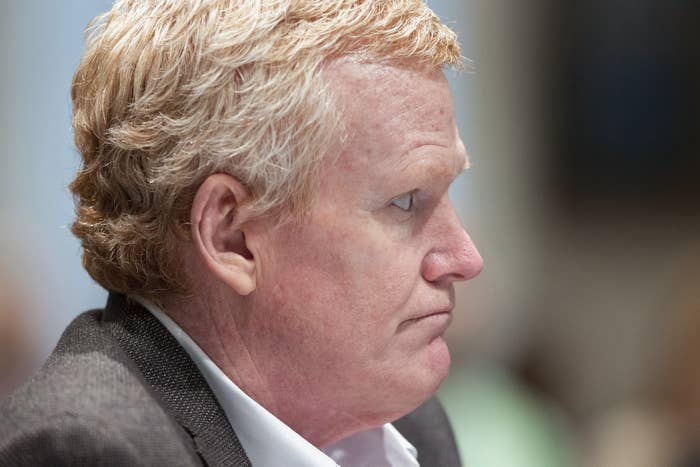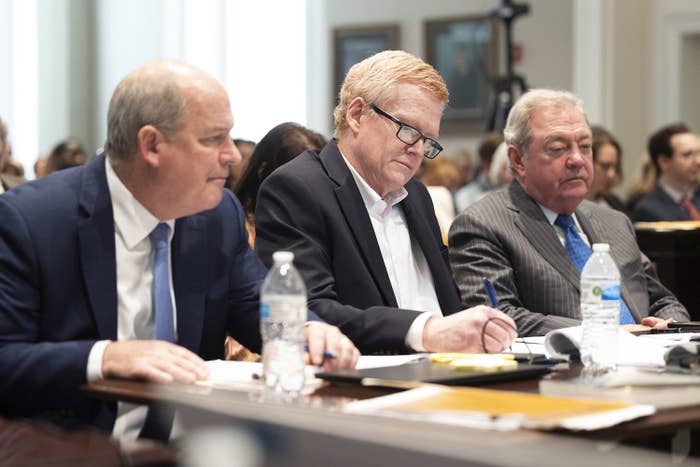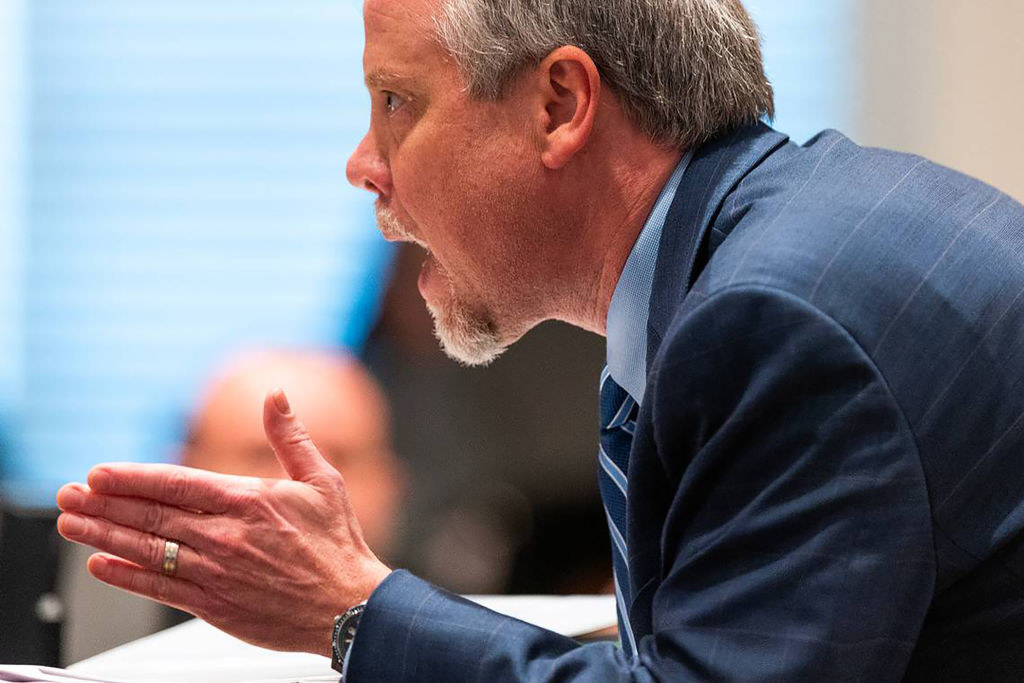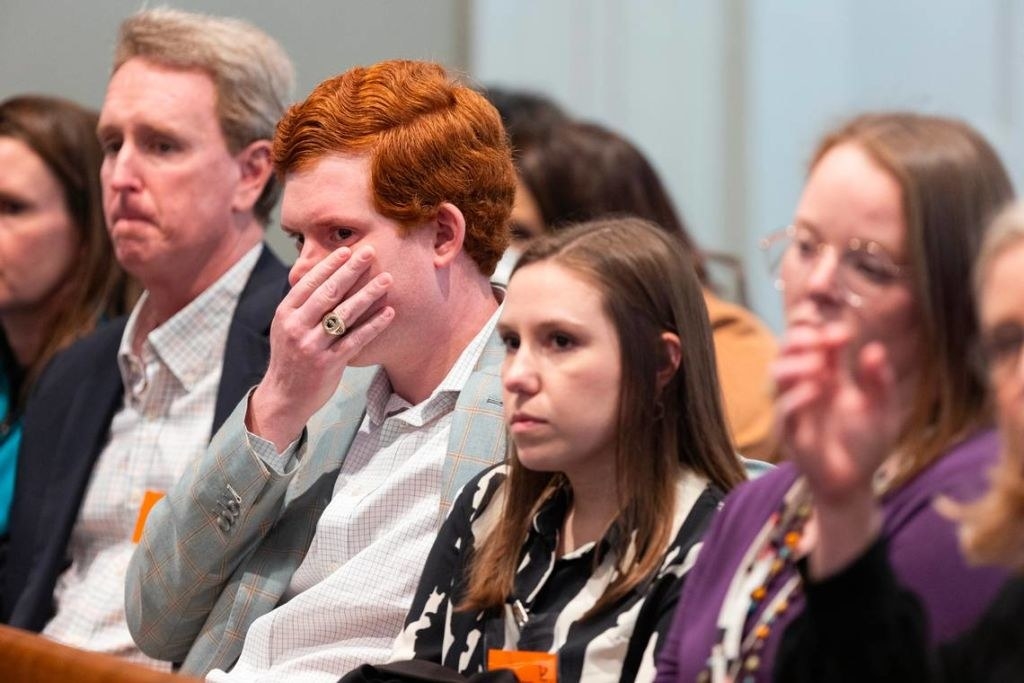
Alex Murdaugh, the scion of a powerful South Carolina legal family whose scandals and secrets were laid bare after the fatal shootings of his wife and son in the summer of 2021, was found guilty on Thursday of their murders.
The guilty verdict closes a chapter on a mystery that had garnered widespread attention almost immediately after the bodies of Maggie and Paul Murdaugh were found on their rural hunting lodge property in the state’s Lowcountry region on June 7, 2021. As it turns out, the killer was the one to call 911 that night: their own husband and father.
The jury deliberated for just three hours before reaching their decision. After weeks of breaking down in tears in court, Murdaugh stood with his attorneys looking straight ahead and blinking as the verdict was read.
"All of the evidence pointed to only one conclusion — that's the conclusion that you all reached," Judge Clifton Newman told the jurors after the clerk read their verdict. "I applaud you all for as a group, and as a unit, and individually evaluating the evidence and coming to the proper conclusion as you saw the law [and] as you saw the facts."
Murdaugh now faces a possible sentence of life in prison. A hearing is scheduled for Friday.
Speaking outside the courthouse Thursday night, state Attorney General Alan Wilson struck a celebratory tone as he thanked prosecutors, court staff, and jurors for the long hours and attention put into the case.
“Wow, what a great day for the people of South Carolina,” Wilson said to cheers and applause. “We got to bring justice and be a voice for Maggie and Paul Murdaugh.”
Referencing the family's status and influence in the state's criminal justice system, Wilson said the guilty verdict proved that “no one — no one, no matter who you are in society — is above the law.”
“A lot of people doubted that this process would work,” the state's top prosecutor said, “and hopefully for those who did doubt the process, hopefully we have instilled and put a little bit of faith back into you and your lives as you view this process as it unfolds.”

The case has transfixed true crime enthusiasts around the world with its many twists and turns. Media, too, were obsessed by the story of a wealthy and powerful small-town family brought down by scandal and tragedy. No less than two competing documentaries were produced before the case even made it to trial, while tens of thousands of people watched daily livestreams of court proceedings. More than five dozen witnesses were called to give evidence as part of the six-week trial and media frenzy that locals in the 5,000-person town of Walterboro said was unprecedented. At one point, the trial was even interrupted by a bomb threat.
When Alex first called 911 on the night of June 7, 2021, he could surely never have imagined the firestorm of speculation and scrutiny that would begin to engulf him. In fact, prosecutors argued that his motive for killing his wife and son was to divert attention away from himself amid a “gathering storm” of events that was threatening to expose his many alleged financial deeds and bring ruin and scandal to the legal empire that generations of Murdaughs before him had built in the area.
“The entire illusion of his life was about to be altered — he couldn't live with that,” prosecutor Creighton Waters told the jury in his closing statement. “He's the kind of person for which shame is an extraordinary provocation.”
For their part, defense attorneys argued that officials were sloppy in preserving or collecting evidence at the crime scene. They also suggested investigators had unfairly zeroed in on Alex as a chief suspect too early, potentially ignoring others, and noted Alex had nothing to immediately gain financially from killing his wife and son. The prosecution’s case was rooted in theory, not fact, the defense argued.
“He was destroyed. He was heartbroken,” surviving son Buster Murdaugh testified about arriving at the property later that night having received a call from his father informing him of the killings. “I walked in the door, saw him, gave him a hug — just broken down.”

Absent any witnesses to the killings, or even any guns that they could definitively pinpoint as murder weapons, prosecutors built a case based on circumstantial evidence. Some of the evidence was highly technical — data showing when cellphones were used or when they recorded steps, GPS data from Alex’s car that showed his speed and location as he left the property — while other testimony essentially forced the jury to question just how much coincidence they were prepared to accept.
Maggie and Paul were each killed with types of ammunition and weapons that were all over the property, for example. Would an outside or hired killer not bring their own? Why did Alex’s cellphone record him practically running shortly after the murders? Why did a seasoned lawyer and prosecutor like Alex, someone who would know about the importance of preserving potential evidence, send the family housekeeper over to clean the home the morning after the killings? And why did Alex later push both this housekeeper and his mother’s caretaker to try to remember a version of events from that day that they said was not correct?
At the center of the prosecution’s circumstantial case, though, was timing — specifically, the sheer volume of events that were all conspiring to come undone at the same moment for Murdaugh, threatening to ruin him. If his years of alleged thefts were uncovered — including millions that he later admitted he took from the grieving family of his family’s former housekeeper who died in 2018 after a fall at the same hunting lodge — Alex was poised to lose his law license, his fortune, and his freedom.
On the very morning his wife and son were killed, the chief financial officer of Alex’s law firm had confronted him about nearly $800,000 in missing fees, telling him she had reason to suspect he’d stolen them. It was the first time in his years of alleged thefts from clients and the firm that someone appeared to be onto him. But, the CFO later testified, the murders brought a sudden end to any internal inquiry as colleagues rallied around Alex to support him.
“Alex was distraught and upset and not in the office much,” said Jeanne Seckinger, the CFO. “Nobody wanted to harass him about nothing that we thought was really missing.”
Similarly, the killings also delayed a lawsuit against Alex from the family of 19-year-old Mallory Beach, who was killed in a 2019 boat crash over which Paul had been charged with involuntary manslaughter. The Beach family had been seeking a court order to force Alex to open up his finances for review, with the matter scheduled to be heard on June 10 — three days after the killings. Not only was that hearing delayed, but the entire lawsuit seemed as good as over after the deaths, Beach family lawyer Mark Tinsley testified, because juries would suddenly be immensely sympathetic to him.
“If Alex had been victimized by a vigilante, nobody would have brought a verdict back against Alex,” Tinsley said.
In his first words to a 911 dispatcher and responding officers at the scene, Alex pointed to the boat crash as the motive for the killings. Paul had been shunned and threatened because of the incident, Alex said, while Maggie had essentially decamped full-time to the family’s beach home elsewhere in the state to avoid the negative local attention.
“I know that’s what this is,” Alex told the very first sheriff’s deputy who arrived on the scene.
Indeed, others also immediately suspected that the murders must have been connected to the boat crash. There had been complaints that Alex and his father used their legal influence to try to interfere with the investigation into Paul, and now those close to the Murdaughs feared the family was being targeted in revenge.
“We were afraid. We didn’t know what was going on. My family was scared. I was scared for Alex and Buster. I thought that they needed protection. I think everybody was afraid,” said Maggie’s sister, Marian Proctor.
Everyone, Proctor said, except one person: “Alex didn’t seem to be afraid.”
By far the most damning piece of evidence against Alex, though, was a video that investigators eventually recovered from Paul’s phone months after the murders. Filmed by Paul just a few minutes before prosecutors contended he and Maggie were shot dead — a time estimate based on their phones both locking for a final time by 8:50 p.m. — the 50 seconds of footage showed Paul trying to corral a dog at the kennels as two voices could be heard in the background. Witness after witness identified the voices as belonging to Maggie and Alex.
Alex repeatedly told both investigators and his own surviving family that he had not seen his wife or son prior to waking up from a post-dinner nap and then driving to his mother’s home. But this video proved that his version of events was not correct. He had been with them just minutes before each of their phones were locked for the final time.
Alex’s defense team eventually conceded the state had proven that he was with his wife and son at that point in time, but insisted that his mere presence at the scene did not indicate guilt. They also denied he was present when the pair were eventually killed, arguing that the state couldn’t even definitively say when that was.
When Alex made the surprise decision to testify in his own defense, he was forced to admit almost immediately that he had been found out as a result of the video and that he had lied about his whereabouts before the murders — something he blamed on drug-induced paranoia. He apologized for lying to his loved ones, but insisted he had nothing to do with the killings.
“Oh, what a tangled web we weave,” Alex said, quoting the 1808 epic poem Marmion by Sir Walter Scott. “Once I told the lie, and I told my family, I had to keep lying.”
Another shocking piece of evidence that emerged early in the trial was a recording of an interview Alex had done with investigators three days after the murders. Asking him about a graphic photo he’d seen of the extent of Paul’s head wounds, prosecutors contended that Alex made a Freudian slip, of sorts: “It’s just so bad. I did him so bad,” they insisted he said.
Alex’s lawyers, however, claimed that he had in fact been saying, “They did him so bad,” even calling Buster to the stand to support their interpretation of the tape.

Buster, his girlfriend, and some of his paternal aunts and uncles attended almost every day of the trial, sitting behind Alex as a show of support. Buster testified that his father had never been violent with the family and sounded completely normal when he called him that night as he drove to his mother’s home.
But the family had secrets too. Alex told investigators he had been addicted to opioid painkillers for 20 years, sometimes spending as much as $50,000 a week on the drugs — money he said he stole from clients and law partners. Alex had done a stint in a detox facility in 2018, Buster testified, but the addiction remained a source of stress in the family right up to the murders. “Mom found several bags of pills in your computer bag,” Paul texted his father about a month before he was killed.
Law enforcement appeared to concede they made several mistakes during their investigation, beginning on the night of the murders. Little, if any, attempt was made to control access to the Murdaugh property, where a coterie of Alex’s friends and family soon arrived to support him. Some even cleaned the house that night, potentially destroying evidence. At least one bloody footprint recovered at the scene was also ultimately found to have belonged to one of the first responders.
Most shockingly, it wasn’t until September — three months after the killings — that authorities searched the home of Alex’s mother, which he had visited on the night in question, ostensibly to create an alibi. Investigators came to believe Alex may have stashed the weapons there and returned in subsequent days to finally dispose of them, but they had no concrete proof for this. They did discover at the home a blue rain jacket with gunshot residue on its interior, but prosecutors struggled to prove definitively that it belonged to Alex or that he had stashed it there.
There were also signs that the state’s investigation was hampered by internal errors. The lead investigator testified before a grand jury that authorities discovered blood splatter on Alex’s clothing, indicating that he fired the fatal shots. But a crucial report, which the investigator said he was not aware of at the time, later found no such splatter.
The defense also tried to introduce their own technical evidence, most notably from a mechanical engineer who re-created the crime scene and analyzed the bullet trajectories, which appeared to come from someone holding the weapons at a low position. Whoever fired the shot that killed Maggie was likely a foot shorter than Alex, the engineer testified.
Again and again, though, attempts by the defense to paint Alex simply as a loving family man came undone. A slew of witnesses who had known Alex for decades said they now felt as if they didn’t truly know him and were shocked by his alleged double life of drugs and crime.
“He effortlessly and easily lied to you for years, and you didn’t know it?” Waters, the prosecutor, asked Mark Ball, a former law firm partner and friend of Alex’s who had been called by the defense.
“Didn’t know it, and didn’t catch it,” Ball said. “The way he was doing it was very, very cunning.”
They all described their shock at hearing that Alex had been shot by the side of a rural road in 2021 on Labor Day weekend, three months after his wife and son were killed. Once again, it appeared the family was being targeted.
Soon, though, Alex himself would be charged over what authorities said was a suicide-for-hire scheme in which he paid his drug dealer to kill him so Buster would receive a $10 million life insurance payout. The plan only seemed to come undone when Alex survived and the ensuing media attention made him the prime suspect in the public eye for his family’s killings.
Prosecutors fought throughout the trial for the jury to hear evidence of that roadside shooting, as well as the many alleged financial crimes, over the defense team’s strenuous objections. The inclusion of the evidence dramatically lengthened the trial, but prosecutors insisted it was central to understanding his alleged motive and to make clear — as he sat in the court each day crying over his dead wife and son — that he was not who he appeared to be.
“Did you really know Alex Murdaugh?” Waters asked Seckinger, the law firm’s CFO.
“I don’t think I ever really knew him,” she replied. “I don’t think anybody knows him.”
Stephanie K. Baer contributed reporting.

